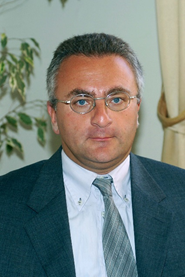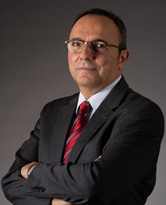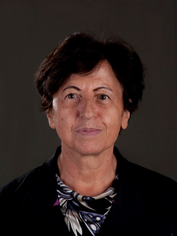Panel#1: Cities of the future: what possible evolution towards the creation of smart communities
Chair: Prof. Antonio Puliafito, University of Messina, Director CINI Lab on Smart cities, Italy
Speakers:- Dr. Glenn Ricart, Founder and CTO, US Ignite smart cities initiative (USA)
- Dr. Marco Conti, Director of the Institute of Informatics and Telematics of the CNR (Italy)
- Prof. Ernesto Damiani, Director of the Robotics and Intelligent Systems Institute, Khalifa University (Abu Dhabi)
- Prof. Serge Fdida, Sorbonne Université (France)
A smart city represents the evolution of today's cities both from a functional and structural point of view,
and strategically uses many enabling factors, such as ICT, to increase sustainable growth and strengthen the
services offered, while ensuring the quality of life and the well-being of citizens. Cities can be seen as a
microcosm of "objects" (eg personal devices, IoT, autonomous vehicles), with one "foot" in the real world
and another in the cyber way of the Internet. Citizens interact with them on a daily basis, and this
generates the so-called "Cyber-Physical convergence", i.e. the creation of a hybrid space in which the
physical and virtual world continuously exchange data to influence and optimize each other. It is thanks to
this convergence that some of the most interesting and useful applications of smart cities are being
developed, such as the continuous monitoring of the state of the city through sensors and actuators, the
dynamic optimization of its infrastructures, the "sensing" of the "sentiment" of city, the configuration of its
services.
In particular, the objectives of interest of a smart city are (but are not limited to): improving the services of
the city; optimize the decision-making process; create smart urban infrastructures; orchestrate physical and
computer resources; address challenging urban issues such as environmental pollution, transport
management, energy use and public health; optimize the use and benefits of next generation
communication (5G and beyond); capitalize on social networks and their analysis; support tactile Internet
applications; and help citizens improve their quality of life.
The panel intends to involve protagonists of these processes, with both technical and managerial skills, to
analyze the experiences of some cities on the transformation into smart communities, identify good
practices, ways of reusing solutions and methodologies to be adopted to proceed with a transfer of
knowledge between public administrations. The fundamental questions we will start from are:
- What experiences can we already share in the implementation of smart cities?
- How is it possible to reuse tools and platforms within the same city and between different cities?
- "One-size-fits-all"? How to set up smart cities projects for companies of heterogeneous dimensions?
- What is the role of the main actors (municipalities, service companies, private operators, ICT platforms, research)?
- Is national coordination appropriate and if so how could it be implemented?
- What relationship exists between citizen safety and public health?
Biography:

Antonio Puliafito is Full Professor of Information Processing Systems at the University of Messina. His interests concern distributed systems, networking, the internet of things, Cloud computing and advanced modeling systems. He has been an auditor for the European Commission since 1998. He has contributed to the software development of the WebSPN, ArgoPerformance and Stack4Things tools. He is co-author of the text "Performance and Reliability Analysis of Computer Systems: An Example-Based Approach Using the SHARPE Software Package", published by Kluwer Academic Publishers. He coordinates the PhD in Cyber Physical Systems at the University of Messina. From 2006 to 2008 he was responsible for Project 901, for the construction of a wired / wireless communication infrastructure within the University of Messina to support services with high added value (winner of the CISCO innovation Award). He coordinated two Grid Computing projects (Trigrid VL and PI2S2) funded by the Sicilian Region and the MIUR for the University of Messina. He was head of the European Reservoir, Vision and CloudWave projects, for the development of cloud services through heterogeneous administrative domains. He was responsible for the PRIN 2008 "Cloud @ Home" project, for the integration of volunteer contribution mechanisms in the cloud environment. He was in charge of the Messina operational unit within the European project H2020 Beacon for the study of federation mechanisms of Cloud resources. He is the scientific manager of the PON01 SIGMA project which proposes the use of the cloud for the management of multi-risk environmental situations. He recently formed the SmartMe.io start-up focused on providing systems and solutions for the Internet of Things. He coordinates the #SmartME crowdfunding initiative to transform Messina into a Smart City. He is responsible for UniME of the ToolSmart project for the reuse of good practices in the smart city field in the cities of Turin, Padua, Lecce and Syracuse. He directs the CINI National Laboratory on "Smart Cities & Communities".

Glenn Ricart is a scientist applying advanced technology to improving the lives of citizens, businesses, organizations, and visitors in smart and connected communities. His nonprofit, US Ignite, is now a decade old, dedicated to the same goals, and now employs 17 people. Its most recent project is using advanced wireless technologies to connect the unconnected and underserved. Previously, Ricart was CEO of National LabmdaRail, Managing Director at PricewaterhouseCoopers, Executive Vice President of Novell, academic CIO at the University of Maryland, and program director at DARPA. He is a member of the Internet Hall of Fame for putting the "Inter" into the Internet by creating the first Internet connection point in today's Internet. He is also the founder or co-founder of 5 startups raising a collective $180M. His current interests include ultra-low-latency edge cloud computing and quantum networking.

Marco Conti is a research director of the Italian National Research Council (CNR) and, currently, he is the director of the IIT-CNR institute. He has published more than 400 scientific articles related to design, modeling, and experimentation of computer and communication networks, pervasive systems, and online social networks. He is the founding Editor-in-Chief (EiC) of Online Social Networks and Media, EiC for Special Issues of Pervasive and Mobile Computing, and, from 2009 to 2018, EiC of Computer Communications. He has received several awards, including the Best Paper Award at IFIP Networking 2011, IEEE ISCC 2012, and IEEE WoWMoM 2013. He was included in the "2017 Highly Cited Researchers" list compiled by Web of Science for the most cited articles in Computer Science. He served as the General/Program chair of several major conferences, including IFIP Networking 2002, IEEE WoWMoM 2005 and 2006, IEEE PerCom 2006 and 2010, ACM MobiHoc 2006, IEEE MASS 2007 and IEEE SmartComp 2021.

Serge Fdida is a Professor with Sorbonne Université since 1995. He has been leading many research projects in High Performance Networking in France and Europe, notably pioneering the European activity on federated Internet testbeds. Currently, he is coordinating the French National Research Instrument FIT and the OneLab facility, two large test platforms on Future Internet technologies. He is a Distinguished ACM Member and an IEEE Senior member. He was one of the founders of the ACM Conext conference, general chair of ACM Mobicom 2015 and IEEE Infocom 2019. Serge Fdida has also developed a strong experience related to innovation and industry transfer, - he was the co-founder of the Qosmos company, - one of the active contributors to the creation of the Cap Digital cluster in Paris, and the President of the EIT Health French community.

Ernesto Damiani is Full Professor at Università degli Studi di Milano, Senior Director of Robotics and Intelligent Systems Institute and Director of Center for Cyber Physical Systems (C2PS) within the Khalifa University, leader of the Big Data area at Etisalat British Telecom Innovation Center, and President of the Consortium of Italian Computer Science Universities (CINI). He is also part of the ENISA Ad-Hoc Working Group on Artificial Intelligence Cybersecurity, where he serves as Rapporteur. According to DBLP (March 2021), Ernesto Damiani has authored 142 journal papers, 339 refereed articles in proceedings of international conferences, and published 57 books and chapters as an author or editor. According to Google Scholar, Ernesto’s work has been cited more than 18,500 times and his h-index is 57; 294 of his papers have at least 10 citations. On Scopus he has 623 documents and more than 7,240 total citations by more than 5,700 documents. His Scopus h-index is 36. With 550 publications listed on DBLP, he is considered among the most prolific European computer scientists. His areas of interest include cyber-physical systems, Big Data Analytics, Edge/Cloud security and performance, Artificial Intelligence, and Machine Learning. Ernesto Damiani has pioneered model-driven data analytics. Ernesto has been a recipient of the Stephen Yau Award from the Service Society, of the Outstanding contributions Award from IFIP TC2, of the Chester-Sall Award from IEEE IES, and of a doctorate honoris causa from INSA – Lyon (France) for his contribution to Big Data teaching and research.
Panel#2: Privacy vs. Utility: Can this Conflict over Personal Data Have Two Winners
Chair: Prof. Yannis Ioannidis, Dept. of Informatics and Telecom, National & Kapodistrian Univ. of Athens, and Athena Research Center, Greece
Speakers:- Prof. Elisa Bertino, Computer Science Department, Purdue University (USA)
- Prof. Minos Garofalakis, Information Management Systems Institute, Athena Research Center, and School of Electrical & Computer Engineering, Technical Univ. of Crete (Greece)
- Dr. Lucian Itu, Artificial Intelligence Team, Siemens Romania, and Department of Automation and Applied Informatics, Transilvania University of Brasov
- Dr. Peter Kairouz, Google Research, USA
With the continuous exponential growth of networking, computing, and storage technologies, our ability to collect, transfer and process vast amounts of data has reached unprecedented levels. Much of this data is personal and is being collected and stored by businesses, the government, social networks, universities and research institutions, hospitals, etc.
The information and knowledge that can be extracted by proper collective analysis of such distributed data is extremely valuable, but its privacy must be preserved as well, for ethical/legal/regulatory reasons or for securing it against malicious parties, which limits or even prevents any access to or deeply meaningful analysis of it. Similar issues exist also for private industrial data that belongs to multiple companies and needs to be interconnected and analyzed together. How can secure and reliable data analytics services be offered over such private data over networks?
What are the algorithmic, cryptographic, or other methods that may optimize the tradeoff between privacy and utility of data? What is the effectiveness of synthetic data as a potential answer to these issues?
What is the currently prevalent legal and regulatory framework globally and what is its impact on the relevant technology? These are some of the questions that this panel will attempt to answer.

Prof. Yannis Ioannidis' research interests include Database and Information Systems, Data Science, Recommender Systems and Personalization, Data Infrastructures, and Human-Computer Interaction, topics on which he has published over 160 articles in leading journals and conferences and also holds three patents. His work is often inspired by and applied to data management and analysis problems that arise in industrial environments or in the context of other scientific fields (Life Sciences, Physical Sciences, Social Sciences, Humanities) and the Arts. He has been the coordinator and legal entity head of OpenAIRE, which implements the European policies on open access to research publications and data, and is the Software Director of the Human Brain Project flagship initiative, Ηe has also led or is currently leading the creation of new international or spin-off companies. He is an ACM and IEEE Fellow, a member of Academia Europaea, and a recipient of the ACM SIGMOD Contributions Award and several other research and teaching awards. A member of the ACM Europe Council, he is also a vice chair of the European Strategy Forum on Research Infrastructures (ESFRI) and a member of the strategic management board of the Greek hub of the UN Sustainable Development Solutions Network.

Elisa Bertino is the Samuel D. Conte Professor of Computer Science at Purdue University. Her recent research focuses on security and privacy of cellular networks and IoT systems, and edge analytics and machine learning for cybersecurity. Elisa Bertino is a Fellow member of IEEE, ACM, and AAAS. She received the 2002 IEEE Computer Society Technical Achievement Award for "For outstanding contributions to database systems and database security and advanced data management systems", the 2005 IEEE Computer Society Tsutomu Kanai Award for "Pioneering and innovative research contributions to secure distributed systems", and the 2019-2020 ACM Athena Lecturer Award.

Prof. Garofalakis' research interests are in the broad areas of Big Data analytics and large-scale machine learning, including database systems, centralized/distributed data streams, data synopses and approximate query processing, and secure/private data analytics. He has published over 150 scientific papers in top-tier international conferences and journals in these areas. He received the 2009 IEEE ICDE Best Paper Award, and 8 of his SIGMOD/PODS/VLDB papers have been invited to journal special issues (ranking in the top 3-5 papers of their respective conferences). He has delivered several invited keynote talks and conference tutorials on approximate query processing, data-stream processing, and distributed data streams. His work has resulted in 36 US Patent filings (29 patents issued) for companies such as Lucent, Yahoo!, and AT&T. Prof. Garofalakis is an ACM Fellow (2018) "for contributions to data processing and analytics, particularly data streaming, approximation and uncertainty", an IEEE Fellow (2017) "for contributions to data streaming analytics", and a recipient of the TUC "Excellence in Research" Award (2015), the Bell Labs President's Gold Award (2004), and the Bell Labs Teamwork Award (2003).

Lucian Mihai Itu is the research group head of the Artificial Intelligence team at Siemens Romania and Professor at the Transilvania University of Brasov. He received the PhD degree in Systems Engineering in 2013 after having collaborated with Siemens Corporate Research, Princeton, USA during the doctoral studies. He has participated in numerous European, National and Industry funded R&D projects. His research interests are: artificial intelligence with focus on machine learning and privacy preservation, modelling of the human physiology, and high performance computing. He has published over 70 papers in various international journals and conferences. He is joint author of more than 40 international patent applications.

Peter Kairouz is a research scientist at Google, where he focuses on federated learning research and privacy-preserving technologies. Before joining Google, he was a Postdoctoral Research Fellow at Stanford University. He received his Ph.D. in electrical and computer engineering from the University of Illinois at Urbana-Champaign (UIUC). He is the recipient of the 2012 Roberto Padovani Scholarship from Qualcomm's Research Center, the 2015 ACM SIGMETRICS Best Paper Award, the 2015 Qualcomm Innovation Fellowship Finalist Award, and the 2016 Harold L.Olesen Award for Excellence in Undergraduate Teaching from UIUC.


